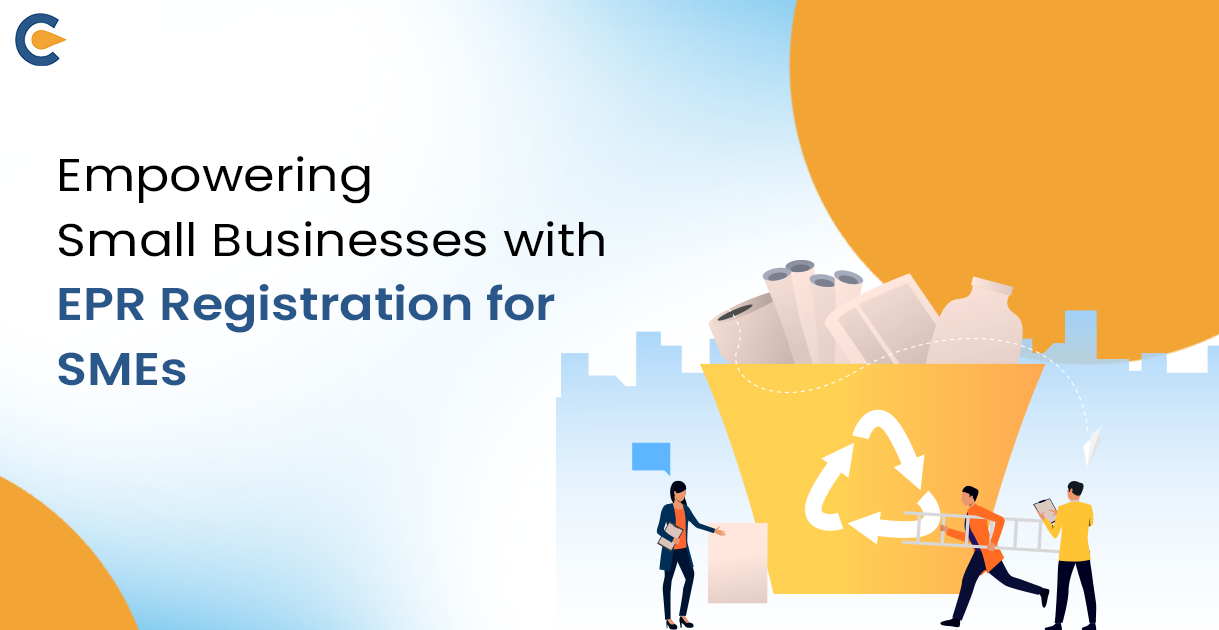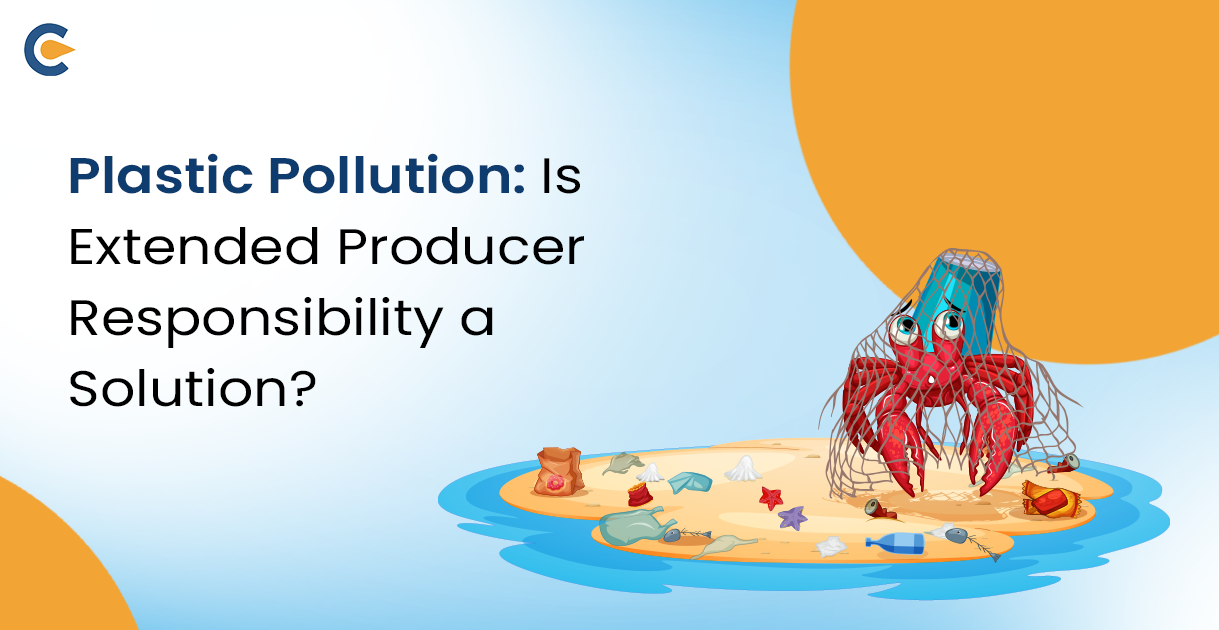Small and Medium Industries were introduced as a concept to address the identity and issues of enterprises, shops, establishments, and manufacturing units as defined and governed by the provisions of the Micro, small, and Medium Enterprises Development Act, 2006. As per the Act, Industries are segregated based on the Micro enterprises, which are defined as units having Net investment in plant and machinery not exceeding Rs. 1 crore. Similarly, industries having net investment in plant and machinery exceeding Rs. 1 crore up to Rs. 10 crore and from Rs. 10 crore up to 50 crore are known as small and medium industries, respectively.
EPR Registration for SMEs certifies that the small-scale entities responsible for the distribution and import of recycled or waste-based products ensure proper waste management and effective handling and disposal of hazardous waste, whereby it does not cause harm or pollute the environment. EPR Plan and recycling channels keep a check on the activities of the distributors and importers, which ensures that they do not overlook their social responsibility towards nature conservation while pursuing their commercial activities.
Understanding Product Responsibility Organizations
Central Pollution Control Board and other regulatory authorities are collectively referred to as the Product Responsibility organizations (PROs) as they have to ensure that the distributors put in place adequate infrastructure and plans to ensure efficient waste collection, disposal, recycling and management and final supply of the end product to the customers in an efficient manner. EPR Registration for SMEs by Statutory authorities also ensure that the entities comply with the record-keeping and periodic reporting requirements since it helps the Government track the data related to hazardous waste management and formulate policies for effective measures to be taken in the future. For emostly, EPR registration for SMEs encourages entities to frame EPR plans to undertake activities intended to discharge the statutory compliances under waste management and safe disposal laws. For effective implementation of the EPR framework, the authorities can impose heavy penalties and fines and even proceed with cancellation of EPR authorization of entities who are found to be deviating/not observing the EPR Compliances for SMEs.
How EPR Authorization benefits SMEs
EPR Registration for SMEs authorization benefits the enterprise by ensuring it’s compliance with the overall environmental protection and sustainable development frameworks and regulations as laid down in the law and regulated by authorized agencies of the Government, known as Product Responsibility Organizations (PRO). The main function of these PROs is to ensure that the relevant enterprise and industrial units comply with environmental protection requirements and enforce compliance if they believe the same is not being observed or violated in any manner. Legal Requirements for SMEs in EPR can be costly and very time-consuming, especially for small and cottage -industries, but they benefit producer organizations in several ways, such as –
Promotes Green Development
EPR registration for SMEs ensures overall sustainable growth and increases the productivity of small industries. It also contributes to the GDP and growth rate of the economy by cutting costs on waste transportation, collection, and management, calibrating waste disposal methods, and enabling the introduction and rapid expansion of new technologies such as eco-modulation and circular supply chin. These concepts and innovations promote ideas in sustainable development, such as making biofuels from crop husk and animal excreta like cow dung, reusable utensils from crop waste, producing nutrients for crops from vermi compost and other-manure-making methods etc. EPR registration for SMEs is not just a statutory requirement but also ensures that the enterprise or manufacturing unit is committed to sustainability and resource efficiency through the implementation of ESG principles.
Streamlines Waste-Management
EPR registration for SMEs is a very important aspect of minimizing waste mistreatment and ensuring statutory compliance for SMEs. The Producer Responsibility Organizations have put in place annual and periodic compliance and reporting requirements for producers, importers, dealers, and recyclers; hence, keeping track of their EPR targets becomes easy and traceable. The process of obtaining EPR authorization requires the waste-producing entity to submit all necessary documents and obtain a clearance certificate known as Consent to Operate and Consent to Establish, issued by the CPCB making. The EPR registration for SMEs and EPR authorization process is fairly transparent and streamlined. Mandatory EPR registration for SMEs, especially for manufacturers ensure that they effectively follow sustainable waste management methods and also ensure the PROs take adequate measures to ensure sustainable EPR practices in product designing, packaging, testing, and deployment of recycled products.
Promoting Circular Economy
The EPR registration for SMEs promotes the sustainable use of waste products by the manufacturing entity, where by the waste product generated can be recycled and put to reuse. Hence, these practices ensure minimal waste and optimum utilization of resources. A circular waste mitigation and recycling strategy ensures that new and unused resources are not used; instead, discarded resources are recycled and put to use under the same. This process further enables the Micro and Small industries to tackle waste generation and resource depletion since the discarded products or industrial refuse are optimized and put to the best possible use.
Cost–Efficient Waste Management Process
EPR Solutions through EPR registration for SMEs offers highly efficient and inexpensive waste management procedures for manufacturers. It offers guidelines for collection, transportation, treatment, disposal, and their reuse. Following this process, manufacturers can often improve the recycled product by making alterations to its design, shape, packaging, efficiency, cost, and price when sold in the market as a refurbished product. All in all, EPR compliances for SMEs enable them to cut on cost, time, energy, and time taken to process waste generated. EPR Registration for SMEs help reduce waste generated at source and incentivize the use of sustainable and eco-friendly product designs.
How is the EPR regime regulated in India?
Legal Requirements for SMEs as per EPR registration for SMEs vary as per the nature and category of waste generated by the SME unit. They are governed and regulated by Product Responsibility Organizations (PROs), such as the State Pollution Control Board and Central Pollution Control Board. Laws and regulations applicable to waste management businesses are product-specific, i.e., they depend upon the type of product being produced, recycled, and refurbished by the SME or manufacturing unit. The various laws and regulations applicable to industries and manufacturing units on the categorization of waste generated are –
- Battery Waste (Management and Handling) Rules, 2001
- Battery Waste Management Rules,2022
- E-Waste (Management and Handling) Rules, 2011
- Environment Protection Act, 1986
- Water (Prevention & Control of Pollution) Act, 1974
- Air (Prevention & Control of Pollution) Act,1981.
- Hazardous and Other Wastes (Management & Transboundary Movement) Rules, 2016
Document required for EPR registration for SMEs
To obtain a valid EPR Authorization for small enterprises, there are several documents required for EPR registration for SMEs that must be submitted before the statutory authority, upon whose verification the EPR Certificate is issued to the applicant entity. Those documents are –
Authorization process for EPR Registration for SMEs
The authorization process for EPR Registration for SMEs requires the applicant entity to submit relevant documents with the regulatory bodies. To obtain an EPR Authorization after making EPR registration for SMEs, the representative or owner of an SME unit is required to apply with the Producer Responsibility Organization (PRO) responsible for licensing authorities.
Roles and Responsibilities of Entities under EPR Registration for SMEs
As per the Extended Producer Responsibility Authorization, the manufacturer is required to discharge the functions of a Producer, Seller, Collector, Recycler, refurbisher, and importer. Individually, each stakeholder has a different role and responsibility in the EPR Regime. The EPR Authorization is a consolidated clearance issued to the manufacturer by the Central Pollution Control Board and State Pollution Control Boards. The duties, roles, and responsibilities of different stakeholders are classified below –
1. Key role of Producers in EPR compliances for SMEs
Producer is an umbrella term used to define a person who is responsible for the complete lifecycle of waste management. A producer must design its product using eco-modulation and eco-friendly concepts and materials right from the start of the production chain so that the product generates a minimum amount of waste upon disposal. The producer must ensure that relevant mechanisms are in place for the purpose of collecting, segregating, transporting, and recycling generated waste to government-approved recycling centres. Finally, the producer shall be responsible for achieving recycling targets and record keeping and reporting the details of the waste recycled per annum.
2. Key role of Dealers in EPR compliances for SMEs
In order to import, distribute, and sell products created from recycled waste and for crucial purposes, the EPR Dealer is someone who buys or procures waste produced by the producer under the EPR. They are engaged in procuring or buying products from an EPR-compliant manufacturer and selling the commodity under their own brand label or trademark on online platforms and retail markets/supermarkets or retail stores. In this way, Brand Owners contribute to waste management and minimization measures under EPR obligations by branding, repacking, and promoting e-waste-compliant products in the market.
3. EPR Compliances for Importers in EPR Registration for SMEs
Importers and distributors of products prepared from waste-management and recycling processes are also required to comply with the EPR Compliances to satisfy product manufacturers’ manufacturing recycling obligations. An importer of waste products is required to obtain a valid import license in compliance with the Import Export Code from the Directorate General of Foreign Trade (DGFT).After obtaining EPR registration for SMEs, an importer of waste goods is also required to make annual and periodic filings with the statutory authorities as well as report annual targets for the products imported.
4. Key role of Recyclers in EPR compliances for SMEs
Recyclers shall ensure that the recycling plant and recycling processes are in compliance with the laws and regulations as laid down by the Central Pollution Control Board. They must ensure that the waste material and residue remaining after the recycling process shall be handled and stored with caution and disposed – off properly at a Waste disposal facility. Furthermore, for the fulfilment of statutory reporting and annual target requirements, recyclers under the EPR regime are required to file an annual and quarterly return of the recycled waste and targets met with the CPCB and obtain an EPR registration for SMEs in prescribed forms, as well as keep a record of the waste recycled/not recycled/disposed of in the past year.
Conclusion
With the advent of skill-building and enterprise management as part of Government Initiatives, Small and Medium Industries are coming up as a rapidly expanding startup and cottage-industry space. As they grow, they are required to comply with the statutory requirements of other large-scale industries; extended Producer responsibility, or EPR, is one such statutory compliance that is required to be fulfilled by MSME units. Extended Producer Responsibility is the concept of Pollution control, envisaging the principle of product lifecycle management and Polluter’s Pay Principle. Under the principle of EPR compliance for SMEs, whoever causes or causes to contribute any adverse impact on the natural environment through their actions shall be liable to redress the negative impact by bringing the damaged environment to its original state.
Why Choose Corpbiz for EPR registration for SMEs?
For small enterprises, complying with statutory requirements pertaining to waste management and recycling can be a challenge since the compliances take up a lot of expenses and require expert diligence and proper channels for waste management and EPR plans. With Corpbiz, you can rest assured of 100% satisfaction with all your compliance needs for your business without having to burn a hole in your pocket. Our cost-effective, customized plans are for everyone’s needs and are designed in such a manner that their effectiveness is not hampered by their cost-efficiency. With Corpbiz, you would be ensured of success for your business while not having to worry about missing out on any major corporate compliances.
Frequently Asked Questions (FAQs)
MSMEs are those manufacturing units that qualify as low-capital, low-investment entrepreneurial ventures engaged in various niche and cottage industries such as textiles, footwear, handicrafts, resource processing, engineering, and information technology.
As per the Act, Industries are segregated based on the Micro enterprises, which are defined as units having Net investment in plant and machinery not exceeding Rs. 1 crore. Similarly, industries having net investment in plant and machinery exceeding Rs. 1 crore up to Rs. 10 crore and from Rs. 10 crore up to 50 crore are known as small and medium industries, respectively.
EPR or Extended Producer Responsibility is the concept of Pollution control, envisaging the principle of product lifecycle management and Polluter’s Pay Principle. Under the principle of EPR compliance for SMEs, whoever causes or causes to contribute any adverse impact on the natural environment through their actions shall be liable to redress the negative impact by bringing the damaged environment to its original state.
An EPR is a certification of compliance with environmentally sound practices for E-waste and hazardous management by the SME Unit. EPR Authorization is issued by the Central Pollution Control Board (CPCB) after the producer entity has cleared all compliances under product-specific waste management rules.
Various stakeholders in an EPR product life cycle are Producers, collectors, Transporters, Recyclers, Refurbishers, and Importers of the product. The PROs, such as the Central Pollution Control Board and State Pollution Control Board, are responsible for making regulations, supervising the activities, and penalizing the stakeholders in the event of any non-compliance.
No, only entities identified as brand owners operating as micro, small, and medium industries are exempted from EPR compliance requirements under Plastic Waste Management Rules, 2016. All other units have to comply with the legal requirements for SMEs in EPR.
The EPR Certificate is issued by the apex pollution control body of India – The Central Pollution Control Board, Ministry of Environment, Forest and Climate Change.
The EPR certificate requires all major information about the applicant as well as the business activity undertaken, along with the details of the product. The documents required to obtain EPR registration for SMEs are the Udyam Registration Certificate for MSMEs issued by the Ministry of MSMEs, Address Proof, ID, and other details of the applicant, Address and proof of ownership of the business, Product information, and details of waste generated/recycled, GSTIN number, MOA, AOA of the company, EPR Ation Plan and CTO/CTE from the CPCB.
CPCB takes about 40 to 60 days after submitting an Application Form to issue an EPR authorization certificate.
EPR authorization in India is governed by various pollution control regulations. Such as-
1. Battery Waste Management Rules,2022
2. Battery Waste (Management and Handling) Rules, 2001
3. Environment Protection Act, 1986
4. Water (Prevention & Control of Pollution) Act, 1974
5. Water (Prevention & Control of Pollution) Act,1981.
6. Hazardous and Other Wastes (Management & Transboundary Movement) Rules, 2016
Producer is used to define a person who is responsible for the complete lifecycle of waste management. A producer must design its product using eco-modulation and eco-friendly concepts and materials right from the start of the production chain so that upon disposal, the product generates a minimum amount of waste.
Importers of products are entities that supply/distribute products made from waste recycling to distributors in India. As per EPR compliances for SMEs, importers are also required to comply with the EPR Compliances in order to satisfy the manufacturing recycling obligations as prescribed by the Government.
Brand Owners are entities who are engaged in procuring or buying products from an EPR-compliant manufacturer and selling the commodity under their own brand label or trademark on online platforms and retail markets/supermarkets or retail stores. In this way, Brand Owners contribute to waste management and minimization measures under EPR obligations by branding, repacking, and promoting e-waste-compliant products in the market.
Non-compliance with the EPR guidelines can lead to a penalty which may extend to Rs. 1 lakh per day for the MSME unit or company as per the E-Waste (Management) Rules, 2015.
Any disputes, complaints or litigations related to environmental laws and their compliances and violations therewith are adjudicated by the National Green Tribunal (NGT), which is situated in New Delhi.
Read our Article: EPR Plastic Registration And EPR Plastic Waste Management











